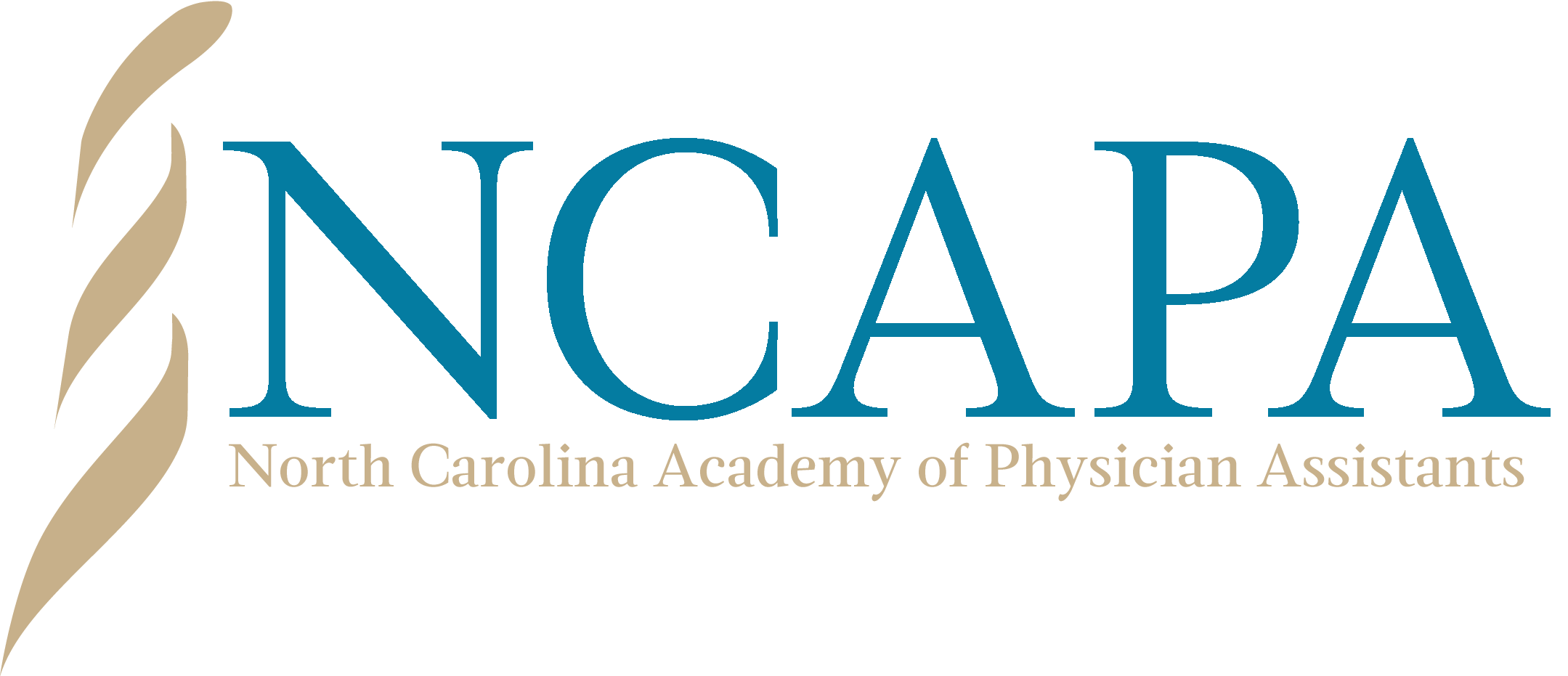According to the US Department of Health and Human Services (DHHS), healthcare providers were reassured by pharmaceutical companies in the late 1990s that patients would not become addicted to opioid pain relievers, leading them to prescribe them at greater rates. This increase led to widespread misuse, and it became increasingly clear that opioids were, in fact, highly addictive. A public health emergency was declared by the US Department of Health and Human Services in 2017. More information on the origins and results of the opioid epidemic from the DHHS can be found here.
PAs are on the front line of the opioid epidemic and are poised to be part of the solution. If you are involved on a regular basis with opioid treatment and/or are willing to be a resource to assist NCAPA in combatting the opioid epidemic, please email Emily Adams emily.adams@ncapa.org.
Controlled Substances CME Requirement
Effective July 1, 2017, all PAs who prescribe controlled substances must earn two credits of controlled substances CME during each two-year CME cycle. There is no annual requirement – all credits must be completed by the end of the CME cycle. For more information, please visit the NC Medical Board Controlled Substances CME Requirement page.
- Opioid Therapy and Pain Management CME: Guidelines, Research and Treatments
- National Institute on Drug Abuse Health Professions Education
- CDC Addiction Medicine Toolkit Training Modules
- Reducing Stigma Education Tools (ReSET)
- SUD 101 Core Curriculum (2023)
CDC Guidelines for Prescribing Opioids
The CDC acknowledges that there are situations in which opioid prescriptions are appropriate and necessary, such as in the treatment of pain from surgery or cancer. Therefore, they have established a set of guidelines for best practices in prescribing opioids for pain management:
- CDC Guidelines for Prescribing Opioids for Chronic Pain
- CDC Checklist for Prescribing Opioids for Chronic Pain
(The North Carolina Medical Board has also endorsed and adopted the guidelines set out by the CDC. The NCMB position statement on prescribing opioids can be found on their website.)
The North Carolina STOP Act
The Strengthening Opioid Misuse Prevention (STOP) Act was passed by the North Carolina General Assembly in June of 2017. This bill was written as a response to the growing opioid crisis and contains provisions to limit the number of unnecessary or fraudulent opioid prescriptions in the state. The STOP Act established:
- Standing orders for overdose reversal medications such as Narcan
- PAs and NPs who work in pain management clinics and prescribe Schedule II and III controlled substances for long-term use must consult with their supervising physician
- Limitations on initial prescriptions of opioids for acute pain and post-operative acute pain
- Schedule II and III drugs must be prescribed using the electronic subscribing system (effective January 1, 2020)
- Dispenser and practitioner use of the Controlled Substances Reporting System CSRS, and penalties for improper use or lack of reporting (effective TBD)
To learn more about how the STOP Act affects PAs in North Carolina, view our fact sheet here.
Understanding the STOP Act from the NCMB.
Read information on Controlled Substance Prescribing from the NC AHEC.
NC Controlled Substances Reporting System (NC CSRS)
Effective July 7, 2021, prescribers must check a patient’s 12-month prescription history before writing a prescription for any Schedule II or Schedule III controlled substance. This requirement is a provision of the NC STOP Act of 2017.
The NC Controlled Substances Reporting System (NC CSRS) is the statewide database that includes prescribing information about every controlled substance dispensed in an outpatient setting. The system is run by state Department of Health and Human Services. Click here for more information and to access the NC CSRS.
More Powerful NC
NCAPA has joined many other statewide organizations and associations by becoming a community partner with More Powerful NC- an organization fighting the opioid epidemic at the grassroots level. More Powerful NC encourages North Carolinians to:
- Properly dispose of opioids in drop boxes
- Talk to providers about the over-prescription of opioids and alternatives to opioid-based pain management
- Find treatment for OUD
You can take the pledge to personally contribute to the fight against opioid addiction on the More Powerful NC website.
Project Lazarus
In 2013, due to the encouragement of Past-President Don Metzger, NCAPA partnered with Project Lazarus, urging all PAs practicing in North Carolina to register with the North Carolina Controlled Substance Reporting System. Project Lazarus, based in Wilkes County, continues to be a leader in community-based action to fight the problem of opioid misuse and overdose.
More Resources for Providers and Patients
Medications for Opioid Use Disorder (MOUD)
MOUD are prescribed by certified health professionals for patients who are experiencing Opioid Use Disorder (OUD). The following are four medications approved by the FDA for the treatment of OUD:
- Naloxone: A medicine that can be administered intravenously, intramuscularly, or as a nasal spray, that temporarily blocks the effects of an opioid overdose, allowing the patient time to receive medical treatment.
- Methadone: A clinic-based treatment, administered as a liquid, that blocks the symptoms of withdrawal.
- Naltrexone: Opioid agonist, administered as a pill or injection that blocks the mental and physical effects of opioids.
- Buprenorphine: A prescribed medicine, administered as tablets, cheek film, or implant, that blocks most of the effects of opioids as well as the symptoms of withdrawal.
More information about the use of medication to treat OUD can be found through the Substance Abuse and Mental Health Services Administration.
More information about the use of Naloxone to reverse an overdose can be found through Naloxone Saves.
For more information on how to remove negative bias when discussing addiction, please visit Words Matter – Terms to Use and Avoid When Talking About Addiction.
PAs and the MAT/MOUD Waiver
Section 1262 of the Consolidated Appropriations Act, 2023 (also known as Omnibus bill), removes the federal requirement for practitioners to submit a Notice of Intent (have a waiver) to prescribe medications, like buprenorphine, for the treatment of opioid use disorder (OUD). With this provision, and effective immediately, SAMHSA will no longer be accepting NOIs (waiver applications).
All practitioners who have a current DEA registration that includes Schedule III authority, may now prescribe buprenorphine for Opioid Use Disorder in their practice if permitted by applicable state law. SAMHSA and DEA established training requirements effective June 27th, 2023. Please see more information in the next panel below.
Effective June 27, 2023, the DEA requires all registered prescribers to have completed eight (8) hours of training focused on the treatment and management of patients with opioid or substance use disorders by their next registration date (initial or renewing).
Practitioners are not required to verify they have completed training until their registration is due for renewal.
PAs who have graduated in good standing from a PA school in the U.S. within the past five years of their DEA registration or renewal and successfully completed a comprehensive curriculum that included at least eight hours of training on treating and managing patients with opioid or other substance use disorders have met the requirement.
PAs who have completed a previous 24-hour waiver training, the American Society of Addiction Medicine (ASAM) Treatment of Opioid Use Disorder Course, or the ASAM 16-Hour Medications for Opioid Use Disorder Course have met the requirement.
This is a one-time requirement that requires no submission of proof. PAs are required to attest that they have completed the required training via a check box on their online DEA registration form. The one-time requirement of eight hours do not need to be completed in one sitting. PAs can complete this requirement over multiple sessions that total eight hours. Please continue to check this webpage for further updates and guidance.
Previous CME and training acquired on opioid or substance use disorders can count towards this requirement.
NCAPA CME and Training to Fulfill the DEA Training Requirement
Click here for a full list of applicable NCAPA CME Courses offered in the past
Free and Low Cost CME Options for DEA Training Requirement
- PCSS – https://pcssnow.org/courses/
- NEJM – https://knowledgeplusoffers.nejm.org/dea-rems-training
- Wake AHEC – https://www.wakeahec.org/dea.htm
- NC Medical Board – https://www.ncmedboard.org/landing-page/controlled-substances-cme-requirement


